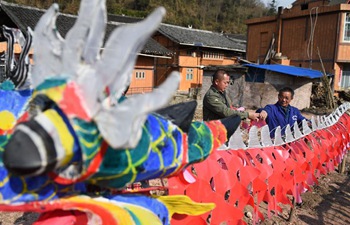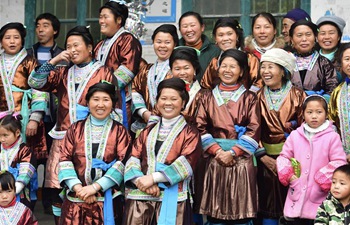by Justice Lee Adoboe
ACCRA, Jan. 17 (Xinhua) -- Fifty-year-old Gabriel Agbeve joined China Harbor Engineering Company (CHEC) in July 2016 as a mason after the Chinese firm won the contract to carry out Ghana's port expansion project at Tema, about 40km east of the capital Accra.
Due to his hard work, Agbeve was elevated by managers at CHEC to the position of Masons Foreman. He has since then been sent outside the country for further training to improve his skills.
"As they saw my performance, they took me outside the country to learn the casing so now I am also training the other masons in casing. We have some other guys who were unskilled laborers but the Chinese have trained them to be professionals," Agbeve told Xinhua during a working tour at Tema Harbor early this week.
Not only has he improved his skills, Agbeve is also able to provide for his family sufficiently, including his daughter now in the university from the wages he earns from his job at the Chinese firm.
"This company is the best because I have worked in about four or five companies before. I cannot mention their names here but I have progressed here far more than I did with the previous companies," he said.
CHEC commenced the expansion work on the Tema Harbor in July 2016 and is expected to complete it within 51 months. The company has put in place procurement and employment measures that create a win-win situation for both employers and employees, as well as service providers and sub-contractors.
Even before half of the duration for the 1.5-billion-U.S. dollar contract elapses, many Ghanaians and companies have enjoyed transformational benefits and opportunities.
The 1,000 Ghanaians employed by the company, according to Yang Tao, Deputy General Manager of CHEC in West Africa, who is also the Project Director for the Tema Port Expansion project, represent 76 percent of all staff, with management alone comprising about 36 percent of this number.
"When we recruited the local staff, we evaluated them and held a training program for them. In addition to the initial training, we also offer them specialized training programs, both locally and outside the country," Yang told Xinhua in an interview.
The staff categories comprise management, skilled laborers, and machine operators, among others.
The project director expressed satisfaction that with the training provided for the workers, even the unskilled laborers had acquired skills as masons and in other fields while the inexperienced artisans had also gathered experience over the period.
"Only special materials which are not available locally are imported, so almost 90 percent of materials used on the project are procured locally through local partners. More than 30 local companies have supply contracts and are supplying all kind of materials," Yang added.
Once a contract is signed, the local company is taken through training to understand the standard specifications and products needed for the contract.
In addition to this, local sub-contractors are engaged while others provide security and other services for the Chinese firm.
"We also have Ghanaian sub-contractors working for us. I give you one example. Our pre-cast yard for the eco-port is a concrete block, which protects the break water, and is 100 percent on contract to a local company and they do a good job," he added.
For most of the local staff, the project has not only offered them jobs to enhance their livelihoods but also given them a life-time opportunity to work in marine engineering under extremely high global standards.
"I have never worked in harbor development before and so as I am working with them now, I am very privileged to be working with China Harbor. We learn new technologies; we learn new societal norms from them. The technology I see here, I have not met it anywhere before," Daniel Kwesi Donkor, Site Engineer in the Casing Yard, told Xinhua.
Moreover, Donkor said the Chinese firm offered continuous on-the-job training to its staff who are trained both in-house and outside through which he had had the privilege to be trained in the premises of British Lloyd as a Hot Weld supervisor while some of his colleagues also had specialist training in steel bending, and concrete works.
Meanwhile, local contractors and suppliers who have contracts with CHEC have very high admiration for the high standards and work ethics with which the company handles affairs.
"From just five haulage trucks to start with, Febrit Limited now has 30 trucks executing haulage contracts for CHEC, due to the good contract terms offered to service providers," said Managing Director, Kwesi Asante.
The contract with the Chinese firm has helped increase his total fleet across the country to 40 from just nine and a staff strength growing to 130 from as low as 25.
Engineer Jacob Sosi, Co-Director of civil engineering firm, DINKWIS, which is also a sub-contractor on the Harbor Expansion project, said the entry of CHEC into the Ghanaian market has actually raised the bar of civil works far beyond what has been known locally.
The most impressive parts of the relationship with the Chinese firm, Sosi said, was their high standards which one has to meet.
"We have about 150 people. We run day and night shifts. Apart from giving jobs to our people, they have also given us the opportunity to train our local guys right from leadership, management, and construction. So that is one of the things we have acquired from them," Sosi said.
John Mensah Tafah, Managing Director of John Tafah Ventures, a signage company working on the project, sees great prospects for his company in the Ghanaian market after the Harbor contract, as his company has even begun receiving enquiries about his designs.
"But you see, my concentration is much on CHEC because they have offered so much to me and my company; and so first I owe my responsibility to them before the Ghanaian market," Tafah said.

















